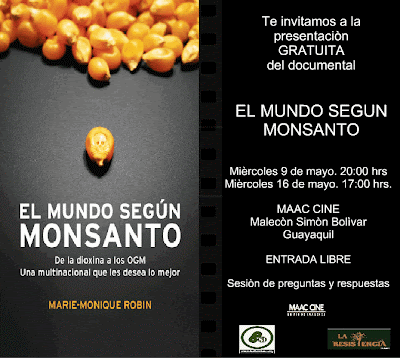![]()
The World according to Monsanto, in free presentation Wednesday, May 8 at 8:00 p.m. and Wednesday, May 16 at 5:00 p.m. at MAAC Cinema, Guayaquil.
The documentary "The World According to Monsanto" tells the story of the main manufacturer of genetically modified organisms (GMOs), also called transgenic crops, whose soybeans, corn and cotton are spreading around the world despite environmental warnings.
The director, Frenchwoman Marie-Monique Robin, focused her film - and book of the same name - on the company in Saint-Louis (Missouri, USA), which for more than a century of existence was the manufacturer of PCB (pyralene), Agent Orange used as a herbicide in the Vietnam War and hormones to increase milk production banned in Europe.
The documentary highlights the dangers resulting from the exponential growth of genetically modified crops, which in 2007 covered 100 million hectares, with genetic properties patented in 90% by Monsanto.
The three-year investigation was based on thousands of official documents, scientific publications and articles found on Google.
The investigation took her to the United States and countries such as India, Paraguay, Brazil and Mexico, comparing the proclaimed virtues of GMOs with realities that often involve farmers sunk by debts to the multinational, people suffering health problems near the plantations or original varieties of grain threatened by transgenic species.
Monsanto holds the patent for "Roundup Ready" GMOs, which are resistant to this powerful herbicide, which in the meantime would contaminate nearby edible crops.
In interviews released to promote the film, Robin said he tried in vain to get answers from Monsanto to all of these questions, but the company decided "not to endorse" his film.
He then decided to rely on hundreds of company documents, conferences and statements, and go and verify in situ whether things were as idyllic as the company motto, "Food, Health, Hope," made them seem.
A chapter of the book, entitled “Paraguay, Brazil, Argentina: the United Republic of Soybeans,” describes the introduction of this crop into these countries, which are now among the largest producers in the world, through a policy of faits accomplis that forced the authorities of Paraguay and Brazil to legalize hundreds of hectares planted with smuggled grains. Much of the soybeans produced in these countries arrive in Ecuador in bulk or processed.
Legalization obviously benefited Monsanto, which was able to collect royalties on its product.
"This is not a film or a book against GMOs, but an important part of the dossier" on the subject, declared the environmentalist leader Nicolas Hulot, one of the most respected personalities in France.
Following the release of the report, there has been no official response published, however Monsanto France said in a bulletin: “The film and the book are issues that were made by people opposed to plant biotechnologies and their objective was to discredit these technologies and the actors involved in their development.”
The World according to Monsanto, in free presentation Wednesday, May 8 at 8:00 p.m. and Wednesday, May 16 at 5:00 p.m. at MAAC Cinema, Guayaquil.

